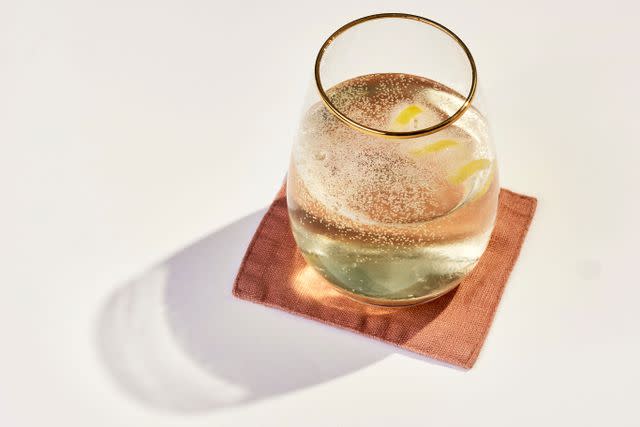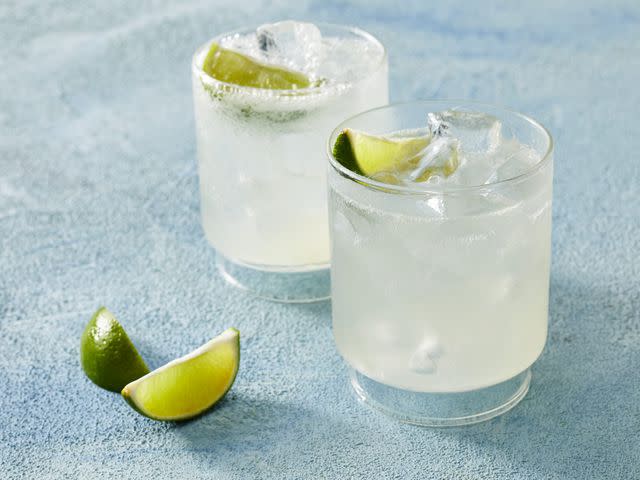What's The Difference Between Mezcal And Tequila?
The differences, similarities, and when to use each one.

Tequila and mezcal are popular Mexican spirits, but trying to differentiate between the two – whether at a cocktail bar or liquor store – might have you with more questions than answers.
Tequila is a type of mezcal and there are several differences between the two.
“Importantly, tequila is made from the Blue Agave whereas mezcal can be a variety of different agave plants,” says Sarah Malik.
Tequila and mezcal are also produced in different areas of Mexico.
“Tequila primarily in Jalisco and mezcal in Oaxaca,” Malik says.
Additionally, there are different approaches to production and distillation, as well as different aging requirements.
Meet The Expert
Sarah Malik is the Associate Professor, Johnson & Wales University, Charlotte Campus
Mezcal Vs. Tequila: Everything You Should Know
While both spirits originate from the agave plant, there are definite differences to understand before sipping or adding to a cocktail recipe.

Victor Protasio, Food Stylist: Ruth Blackburn, Prop Stylist: Christina Daley
What Is Mezcal?
Mezcal is any spirit that is made with the agave plant. The main area for production is around the state of Oaxaca, Mexico, where there are many different varieties of agave.
“The word originates from the Nahuatl language which translates loosely into ‘oven cooked’ and it carries a distinct smoky aroma due to the agave pi?as being cooked in pits,” Malik says.
Related: Smoky Watermelon-Mezcal Fresca
How Mezcal Is Made
Distilled from roasted agave plants, the producers often use the agave fibers in the fermentation process to add more character. Malik adds, “Although herbs and fruits can also be added, most mezcal has 100% agave.”
Malik says that many people associate the “worm” with Mezcal, but this is only found in a few mezcals and generally in the state of Oaxaca.
“The worm – a larva from a moth that lives on the agave – was traditionally used to indicate alcoholic strength of the mezcal,” she explains. “The stronger the alcohol the more preserved the worm would appear.”

What Is Tequila?
Tequila is a type of mezcal made from blue agave. Malik tells Southern Living that Norma Oficial Mexicana (NOM) recognizes two types of tequila: tequila and 100% agave tequila.
“The better-quality tequila is, of course, the 100% agave tequila which must be produced using 100% blue agave,” she says.
Related: 18 Utterly Refreshing Tequila Cocktails You'll Want To Make Again And Again
How Tequila Is Made
Malik calls the production of tequila “very interesting” and involves a jimador using a sharp tool called a coa, to ready the agave for harvest. Producers cut the central flower, which then prompts the agave to send the sap to its pi?a, which swells.
“When the pi?a is harvested, sometimes weighing up to 170 pounds, they are taken to the distillery where they are cooked in steam ovens (called) hornas for two days. This process allows the sugars to develop,” Malik explains.
Once the pi?as are crushed, the juice will then be fermented and eventually distilled to create tequila.
Different Types Of Tequila and Mezcal
Reposado means rested and a?ejo means aged. The differences between the two are how long they have spent in a barrel aging.
Tequila
Blanco or Silver Tequila: 0 to 2 months and light in color
Reposado Tequila: 2 to 12 months and golden in color
A?ejo Tequila: 1 to 3 years and aged the longest of all tequilas with richer flavors
Mezcal
Unlike tequila, many mezcals are not cask aged, but one can find reposado and a?ejo mezcals in certain locations.
Joven Mezcal: 0 to 2 months
Reposado Mezcal: 2 to 12 months
A?ejo Mezcal: 1 year minimum
When To Use Mezcal Vs. Tequila
Malik says blanco or silver tequila is “water-white” in the bottle and is perfect for making cocktails due to the appearance and the price point.
“The younger tequilas are often spicier with aromas and flavors of citrus and herbal notes,” she says. “Older versions have more influence of oak so one would expect to see caramel and vanilla coming into the flavor profile and maybe used for sipping or simple mixed drinks.”
Mezcal can often be more smoky.
“(It’s) more conducive to a sipping spirit rather than mixed into a cocktail,” Malik says.
For more Southern Living news, make sure to sign up for our newsletter!
Read the original article on Southern Living.
